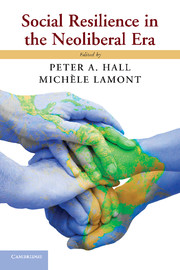Book contents
- Frontmatter
- Contents
- Contributors
- Foreword
- Prologue
- Acknowledgments
- Introduction
- Part I Neoliberalism
- 1 Neoliberalism
- 2 Narratives and Regimes of Social and Human Rights
- 3 Neoliberal Multiculturalism?
- Part II The Social Sources of Individual Resilience
- Part III Social Resilience on a Macro Scale
- PART IV Communities and Organizations as Sites for Social Resilience
- Index
- References
1 - Neoliberalism
Policy Regimes, International Regimes, and Social Effects
Published online by Cambridge University Press: 05 May 2013
- Frontmatter
- Contents
- Contributors
- Foreword
- Prologue
- Acknowledgments
- Introduction
- Part I Neoliberalism
- 1 Neoliberalism
- 2 Narratives and Regimes of Social and Human Rights
- 3 Neoliberal Multiculturalism?
- Part II The Social Sources of Individual Resilience
- Part III Social Resilience on a Macro Scale
- PART IV Communities and Organizations as Sites for Social Resilience
- Index
- References
Summary
In the final three decades of the twentieth century, the world's political economic framework underwent a far-reaching transformation from a state-centric to a neoliberal form (Sewell 2005). In the years following World War II, economies in all areas of the world had been governed by state-centered regulatory regimes. In the wealthy countries of North America, Western Europe, Japan, Australia, and New Zealand, economies were based on free markets and private property, but they were carefully steered and regulated by democratic Keynesian welfare states. In the communist countries, almost all economic activity took place in authoritarian state institutions. And in most of the major countries of Africa, Asia, and Latin America, governments imposed ambitious schemes of state-led development. Over the course of the 1970s, state-led regulatory regimes entered into crisis. By the 1990s, the communist regimes had fallen or had been thoroughly transformed from within by introducing markets and privatizing production. The advanced capitalist countries had dismantled or watered down their regulatory states by privatizing publicly owned enterprises, lifting capital controls, deregulating markets, and, more selectively, paring back welfare guarantees. And the vast majority of developing countries in Asia, Africa, and Latin America had abandoned important elements of their nationalist development strategies and opened their borders to global flows of capital and goods – some on their own volition and others under the coercive urging of the International Monetary Fund (IMF) and the World Bank. All of these countries had become part of a rapidly integrating world market regulated by global rules administered by economic governance institutions such as the World Trade Organization and disciplined by instantaneous global exchanges for currencies, securities, and bonds.
- Type
- Chapter
- Information
- Social Resilience in the Neoliberal Era , pp. 35 - 68Publisher: Cambridge University PressPrint publication year: 2013
References
- 54
- Cited by



